|
|
| Sei in: Cinema e Medioevo ® Indice alfabetico dei film |
SanjUrO
(Tsubaki Sanjuro)
1962, regia di Akira Kurosawa
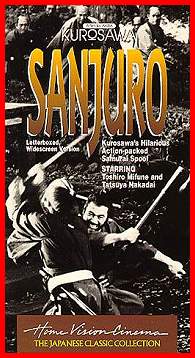
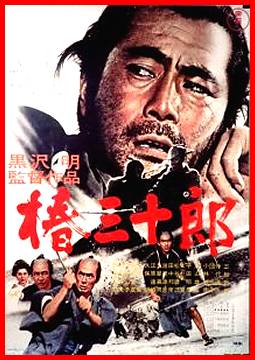
Scheda: Nazione: Giappone - Produzione: Kurosawa Films, Toho - Distribuzione: Titanus, Criterion Collection, Toho Company Ltd. - Soggetto: dal racconto Peaceful days di Shugoro Yamamoto - Sceneggiatura: Ryuzo Kikushima, Akira Kurosawa, Hideo Oguni - Fotografia: Fukuzo Koizumi, Takao Saitô - Montaggio: Akira Kurosawa - Scenografia: Yoshiro Muraki - Musiche: Masaru Satô - Formato: B.N. - Durata: 96'.
Cast: Toshirô Mifune, Tatsuya Nakadai, Keiju Kobayashi, Yuzo Kayama, Reiko Dan, Akihiko Hirata, Takashi Shimura, Kamatari Fujiwara, Takako Irie, Masao Shimizu, Yunosuke Ito, Akira Kubo, Kenzo Matsui, Hiroshi Tachikawa, Yoshio Tsuchiya, Kunie Tanaka.
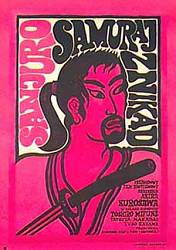
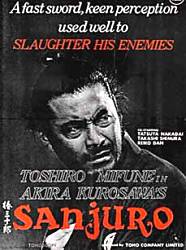
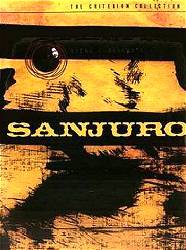
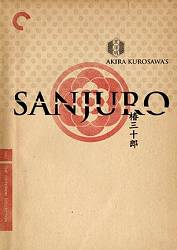
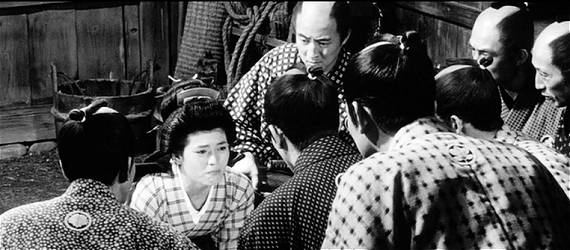
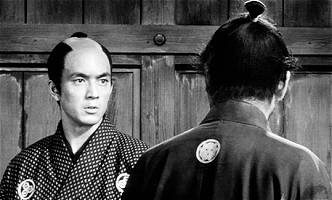
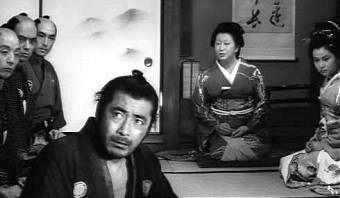
![]() Trama e commenti: cinematografo.it
- kataweb.it
- mymovies.it
- repubblica.it
- cinema.castlerock.it
- scaruffi.com:
«All'inizio degli anni Sessanta Kurosawa diresse un paio di western alla giapponese,
Yojimbo (1961) e
Sanjuro (1962), che l'humor del regista trasfigura parodisticamente (anticipando il western all'italiana e che mettono ancora in luce lo sdoppiamento della personalità Kurosawa in angelo e bestia.
L'individuo animalesco, rappresentato generalmente dalla maschera di Mifune, è l'altra faccia di una forza morale capace di qualsiasi impresa per il bene della comunità (una fusione psicanalitica di eroe western e antieroe zavattiniano, fra cinema degli impulsi primordiali e cinema dei buoni sentimenti).
... Janjuro è un samurai astuto e straccione che accorre in aiuto di nove colleghi perseguitati dai prepotenti e disonesti tiranni della zona che sono stati da essi smascherati; è un film tutto basato sugli scontri, sui duelli e sugli inseguimenti, come al solito miscele di truculenza e comicità (nell'ultimo duello, o parodia di duello, dal corpo della vittima il sangue zampilla
letteralmente) ...».
Trama e commenti: cinematografo.it
- kataweb.it
- mymovies.it
- repubblica.it
- cinema.castlerock.it
- scaruffi.com:
«All'inizio degli anni Sessanta Kurosawa diresse un paio di western alla giapponese,
Yojimbo (1961) e
Sanjuro (1962), che l'humor del regista trasfigura parodisticamente (anticipando il western all'italiana e che mettono ancora in luce lo sdoppiamento della personalità Kurosawa in angelo e bestia.
L'individuo animalesco, rappresentato generalmente dalla maschera di Mifune, è l'altra faccia di una forza morale capace di qualsiasi impresa per il bene della comunità (una fusione psicanalitica di eroe western e antieroe zavattiniano, fra cinema degli impulsi primordiali e cinema dei buoni sentimenti).
... Janjuro è un samurai astuto e straccione che accorre in aiuto di nove colleghi perseguitati dai prepotenti e disonesti tiranni della zona che sono stati da essi smascherati; è un film tutto basato sugli scontri, sui duelli e sugli inseguimenti, come al solito miscele di truculenza e comicità (nell'ultimo duello, o parodia di duello, dal corpo della vittima il sangue zampilla
letteralmente) ...».
![]() Plot Summary, Synopsis, Review: IMDb - entertainment.msn.com
- tvguide.com -
greencine.com -
rottentomatoes.com
- dvdclassik.com - filmzentrale.com - cine-passion.site.voila.fr -
jeevimovie.com - zonadvd.com - kfccinema.com - dvdbeaver.com:
«Toshiro Mifune swaggers and snarls to brilliant comic effect in Akira Kurosawa’s tightly paced, beautifully composed
Sanjuro. In this sly companion piece to Yojimbo, the jaded samurai Sanjuro helps an idealistic group of young warriors weed out their clan’s evil influences, and in the process turns their image of a “proper” samurai on its ear. Less brazen in tone than its predecessor but just as engaging...
Based upon the novel Peaceful days by Yamamoto Shugoro, Kurosawa wrote the script for
Sanjuro before doing Yojimbo, but rewrote it after Yojimbo became a success, changing the main character from a weak samurai to Sanjuro, as the study decided it to be sort of a sequel to
Yojimbo. Kurosawa was going to give the script to Horikawa Hiromichi, his former assistant director, but Toho asked Kurosawa to do it, who then rewrote it again, for the third time, this time making Sanjuro even stronger.
The story is even more simple than Yojimbo. The nephew of the chamberlain and his friends, all young samurai, try to clean up the corruption in the city. Failing, Sanjuro steps in to help them.
Mifune is amazing as Sanjuro. Virtually repeating his character from
Yojimbo, Kurosawa even copies the “my name is…” scene, Sanjuro is now a moral instructor, rather than an immoral dog. Mifune has also refined the character. Still having his idiosyncrasies, the context makes him stand more out, thus he underplays them slightly. I have always found it fascinating to view the two films back to back and see how Mifune is able to control his physical acting, at times even parodying his own character.
As the most didactic film by Kurosawa, it very much plays upon the naivety of the young samurai and the wisdom of the old samurai, and can be viewed as a variation of the oyabun-kobun relationship. Constantly moral issues are presented and answered for us. But, even though most of Kurosawa’s films are more or less didactic, due to his humanism,
Sanjuro uses it as a sharp tool of satire and to note upon the fake and real samurai. Again here physical acting is important...».
Plot Summary, Synopsis, Review: IMDb - entertainment.msn.com
- tvguide.com -
greencine.com -
rottentomatoes.com
- dvdclassik.com - filmzentrale.com - cine-passion.site.voila.fr -
jeevimovie.com - zonadvd.com - kfccinema.com - dvdbeaver.com:
«Toshiro Mifune swaggers and snarls to brilliant comic effect in Akira Kurosawa’s tightly paced, beautifully composed
Sanjuro. In this sly companion piece to Yojimbo, the jaded samurai Sanjuro helps an idealistic group of young warriors weed out their clan’s evil influences, and in the process turns their image of a “proper” samurai on its ear. Less brazen in tone than its predecessor but just as engaging...
Based upon the novel Peaceful days by Yamamoto Shugoro, Kurosawa wrote the script for
Sanjuro before doing Yojimbo, but rewrote it after Yojimbo became a success, changing the main character from a weak samurai to Sanjuro, as the study decided it to be sort of a sequel to
Yojimbo. Kurosawa was going to give the script to Horikawa Hiromichi, his former assistant director, but Toho asked Kurosawa to do it, who then rewrote it again, for the third time, this time making Sanjuro even stronger.
The story is even more simple than Yojimbo. The nephew of the chamberlain and his friends, all young samurai, try to clean up the corruption in the city. Failing, Sanjuro steps in to help them.
Mifune is amazing as Sanjuro. Virtually repeating his character from
Yojimbo, Kurosawa even copies the “my name is…” scene, Sanjuro is now a moral instructor, rather than an immoral dog. Mifune has also refined the character. Still having his idiosyncrasies, the context makes him stand more out, thus he underplays them slightly. I have always found it fascinating to view the two films back to back and see how Mifune is able to control his physical acting, at times even parodying his own character.
As the most didactic film by Kurosawa, it very much plays upon the naivety of the young samurai and the wisdom of the old samurai, and can be viewed as a variation of the oyabun-kobun relationship. Constantly moral issues are presented and answered for us. But, even though most of Kurosawa’s films are more or less didactic, due to his humanism,
Sanjuro uses it as a sharp tool of satire and to note upon the fake and real samurai. Again here physical acting is important...».
![]() Approfondimenti: Movie
Review
Approfondimenti: Movie
Review
Seguito del film La sfida del samurai (Yojimbo).